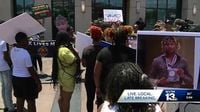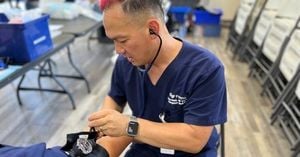In the quiet suburb of Homewood, Alabama, the tragic shooting of 18-year-old college freshman Jabari Peoples has ignited a fierce demand for transparency and justice. Peoples, a promising student majoring in computer information systems and criminal justice, was fatally shot by a police officer on the night of June 23, 2025. The incident has since stirred community outrage, legal battles, and calls for accountability that continue to reverberate through the city.
The circumstances surrounding Peoples' death remain deeply contested. According to the Homewood Police Department, the encounter began when an officer approached a vehicle parked behind a soccer complex after smelling what appeared to be marijuana. Recreational cannabis is illegal in Alabama, though medical marijuana is permitted. The officer ordered Peoples and his girlfriend out of the vehicle. When the officer attempted to arrest Peoples for unlawful possession of a controlled substance, a physical struggle ensued. The department's statement claims that Peoples knocked the officer to the ground and grabbed a handgun from the driver’s-side door pocket. Multiple verbal commands were reportedly given for Peoples to release the weapon.
However, this narrative is sharply disputed by Peoples' family and their legal representatives. Peoples’ girlfriend told the family and civil rights attorney Ben Crump that Peoples was unarmed during the encounter. She also described how they were approached by a man in an unmarked vehicle without lights or sirens and without visible identification, and that they complied with the orders given. This starkly contrasts with the police account and has fueled skepticism about the official version of events.
A pivotal piece of evidence—the officer’s body camera footage—has yet to be released publicly or even to the family. The Homewood Police Department transferred the video to the Alabama Law Enforcement Agency (ALEA), which is conducting the investigation. ALEA has declined to release the footage, citing concerns that doing so could hinder their ongoing investigation. This stance has frustrated the family and their attorneys, who argue that the video is essential to understanding why Peoples was shot in the back and what happened to the bullet, given that an independent autopsy found no exit wound or bullet in his body.
Ben Crump, a nationally recognized civil rights lawyer, has been vocal in demanding the release of the video. At a July 22 news conference, he implored state officials and the police department to provide the footage, emphasizing that Peoples “represented the very best of what we had to offer and was doing everything right.” Crump’s call for transparency echoes the community’s growing mistrust of law enforcement and the justice system.
The independent autopsy, conducted by a medical examiner in Atlanta, revealed that Peoples was shot in the back, with no bullet recovered and no exit wound found. This finding contradicts the police department’s narrative and raises troubling questions about the shooting’s circumstances. Despite these revelations, the Jefferson County Coroner’s Office conducted its own autopsy without the family’s consent, and the official police report on the shooting has yet to be made public. Chief Deputy Coroner Bill Yates confirmed that ALEA requested the coroner’s office not to release any information about the case.
The lack of transparency has sparked a wave of activism and community response. Black Lives Matter Birmingham has organized a boycott of Homewood businesses, calling on residents and visitors to withhold their spending in the city until the family is granted access to the body camera footage and receives answers. Eric Hall, a Black Lives Matter member, announced that the boycott would last 100 days, urging people not to spend “one dime in the city of Homewood until this family has some answers.”
Many local business owners have expressed support for the boycott and the family’s quest for justice. Hayley Holdridge of Ritual Shelter acknowledged the discomfort the boycott would cause but stressed its necessity. “We cannot continue to just run past these events, like the death of a teenager did not just happen in our backyards,” she said. The boycott aims to pressure city and state leaders to act while fostering community healing through open dialogue about grief and accountability.
Despite ALEA’s refusal to release the video during its investigation, Jefferson County District Attorney Danny Carr has pledged to show the footage to the Peoples family once it comes under his jurisdiction. Attorney Leroy Maxwell, representing the family alongside Crump, expressed cautious optimism about Carr’s promise, stating, “DA Carr has always been a man of his word. He sympathizes with victims and their families, I look forward to his call.”
Yet, community activists remain wary. Hall warned that ALEA might continue to delay the process in an effort to silence calls for transparency. “But this time, we will not be silent and we will not go away,” he declared. Rev. Wayne Taft Harris Jr. of Black Lives Matter called for solidarity across racial and social lines, urging people who have experienced grief or who care about justice to join the boycott. He highlighted Walmart, one of Homewood’s busiest businesses frequented by diverse shoppers, as a focal point for the protest.
The legal landscape complicates the situation further. Alabama law currently does not classify police body camera footage as public record, according to Evans Bailey, General Counsel for the Alabama Press Association. Bailey explained that police investigative files, including body cam videos, are generally exempt from open records laws. While recent legislation permits law enforcement agencies to release footage, there is no legal obligation to do so. This discretionary power often results in selective transparency, which undermines community trust and accountability.
“Body camera footage is just showing what happened. There’s nothing investigative about it,” Bailey said. “It won’t have a detective’s thoughts or feelings. It’s just facts.” Yet, despite this clarity, lawmakers in Montgomery have not moved to change the law to ensure greater public access. Bailey warned that without reform, trust between law enforcement and communities will continue to erode, especially when videos are withheld or released selectively.
Meanwhile, the Peoples family has pursued legal avenues to compel the City of Homewood to release the body camera footage. The city responded to the petition, but as of mid-July, the family had not received the response publicly. A hearing on the matter is scheduled for August 4, 2025. The family is also considering filing wrongful death and civil rights lawsuits, signaling that the fight for justice is far from over.
As the summer of 2025 unfolds, the questions surrounding Jabari Peoples’ death remain unanswered. The community’s demand for transparency, accountability, and healing grows louder, fueled by the unresolved contradictions between official accounts and independent findings. The boycott, legal battles, and public outcry underscore a broader struggle over police practices, racial justice, and the right to truth.
In Homewood, the call is clear: show the video, tell the truth, and honor the life of a young man whose promising future was cut tragically short.




